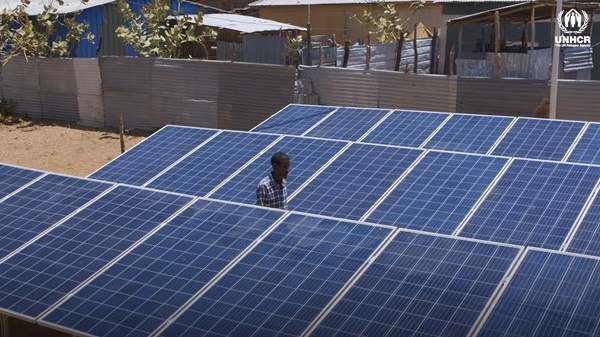
IKEA Foundation’s investment and cooperative’s hard work are paying off: electricity from the solar mini grid has already reached approximately 31,230 refugee and host community households
The nearest national electric grid to Ethiopia’s Melkadida Refugee Camp is more than 200 kilometers away. Yet there is power. There is light.
And there is opportunity. It all started with a visionary partnership between the private sector, host communities and refugees.
Most of the over 210,000 refugees in the five camps around Melkadida, in southeastern Ethiopia, were forced to flee conflict and drought in Somalia over the last 12 years. One of them is Elias Nunow Hirab, who arrived in 2011 when he was 14 years old.
“When I first came here, we didn’t know anyone, and my mother started collecting firewood to sell, which kept us fed. [She] was able to pay my school fees, and I started learning English,” he explained. “Then in 2014, [an organization] that supported youth invited us to come and participate in their [training] programs. I chose electricity because I was interested in technical skills.”
The Melkadida Compact
For Elias and other refugees in the camps, this is where preparation met opportunity: IKEA Foundation had started a partnership with UNHCR, the UN Refugee Agency, two years before, and was beginning a transformative approach in the area focusing on livelihood programs to help foster socio-economic inclusion, sustainable livelihoods, and self-reliance.
IKEA Foundation was one of the first and biggest private-sector players to partner with UNHCR and other aid agencies during the initial influx of Somali refugees. It remains the largest philanthropic investment made through UNHCR in any refugee context over the last decade. This long-term engagement created an unparalleled opportunity to test new approaches for strengthening inclusion and collaboration.
IKEA Foundation’s investments into services and infrastructure have benefited both refugees and host communities, providing valuable evidence that has helped inform Ethiopia’s progressive refugee policies and inclusive local development approach known as the Melkadida Compact.
“Residing in camps tends to be very long, very protracted. And the opportunity here was to take a look at how we can deal with that protracted situation in a more productive way,” said Per Heggenes, IKEA Foundation CEO. “How can we do something that makes sure that both the host community and the refugees […] develop and thrive? Energy is absolutely essential for economic development.”
Continue reading this story on UNHCR
Source: UNHCR
